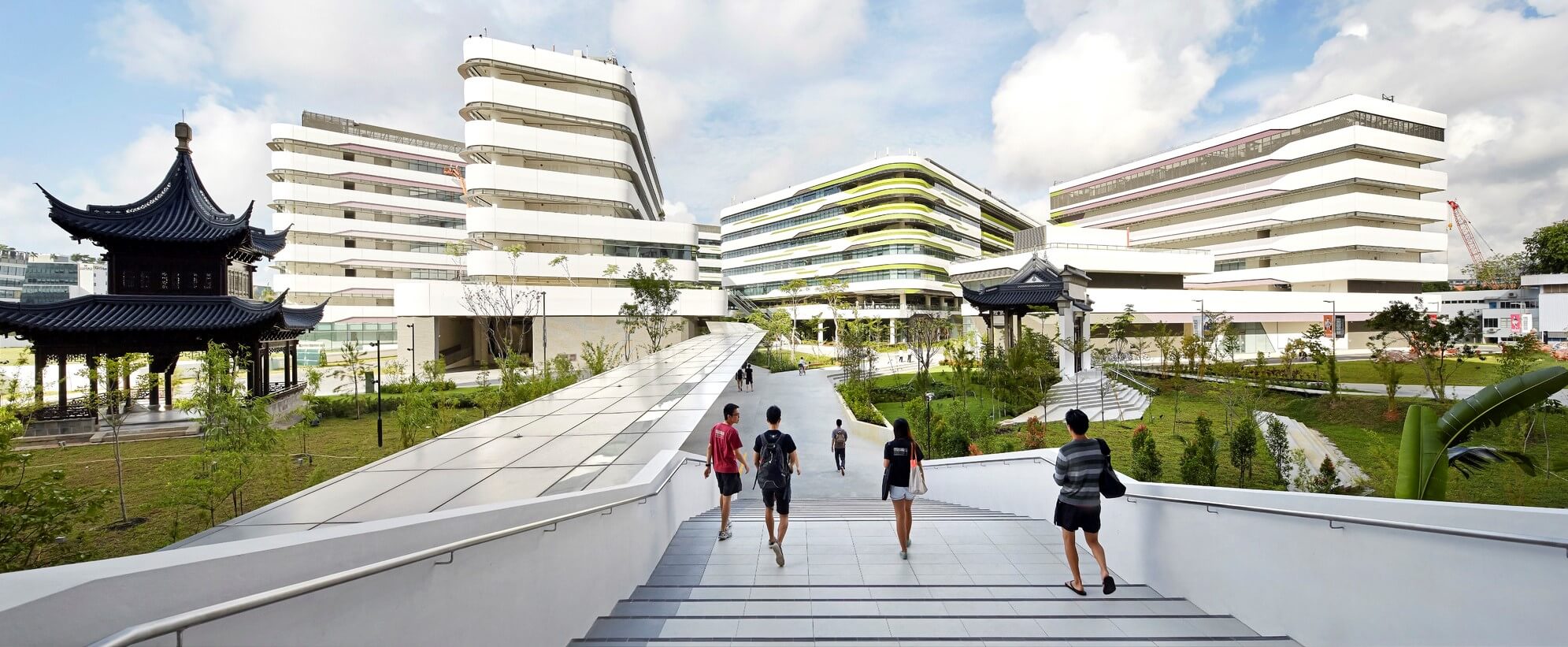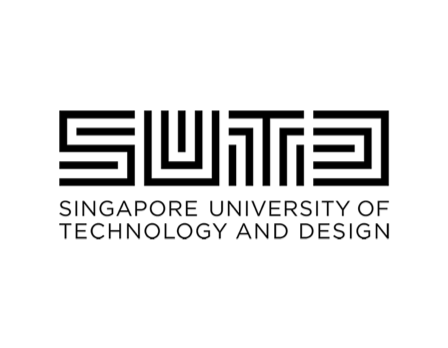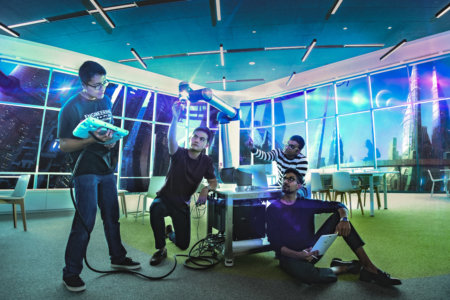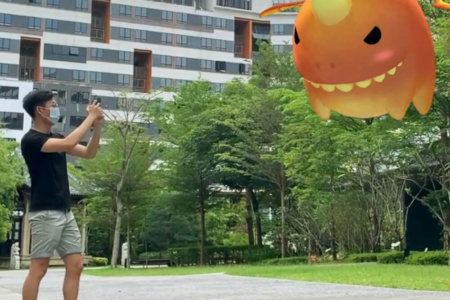As Singapore adopts a 2030 Green Plan to advance a systematic national agenda on sustainable development, one university is already ahead of the game. At Singapore University of Technology and Design (SUTD), a Sustainability Plan is already in motion to steer the campus towards a greener culture and greater impact.
The concept is interwoven into its curriculum to align with 21st century learning. An interdisciplinary approach makes this possible — at SUTD, this is at the heart of its pedagogy, where a strong commitment to sustainable, forward-thinking solutions produces graduates with the knowledge, skills and experience to address real-world issues with passion.
A stronger base to excel in
A defining feature of SUTD’s unique approach to academics is the interdisciplinary nature of its programmes organised along five degree programmes: Architecture and Sustainable Design (ASD), Computer Science and Design (CSD), Design and Artificial Intelligence (DAI), Engineering Product Development (EPD) and Engineering Systems and Design (ESD). Eschewing conventional faculty structures where subjects are separated, SUTD programmes are instead interconnected across disciplines, with a strong focus on digital competencies and design thinking.
The SUTD academic journey begins with a solid first-year curriculum — the Freshmore terms (first 3 terms) build the foundation in Science, Mathematics and Technology, Humanities, Arts and Social Sciences (HASS) and Design Innovation. These terms provide a broad and rigorous education and aims to provide the students with a strong base to select and excel in their choice of major, as well as build foundational literacy for future careers and endeavours.
Launched in January 2021, Science for a Sustainable World is now a Freshmore course, the first one at SUTD to exclusively focus on sustainability. “The course explores five out of the 17 United Nations Sustainable Development Goals (SDGs), where we link first year undergraduate science concepts with sustainable materials, clean water, renewable energy and biodiversity on land and in the ocean,” explains Dr. Tan Mei Xuan, a Senior Lecturer at SUTD.
For Dr. Tan, sustainability means moving past climate crisis discussions into effective action. “We already have some solutions available to us, but we need to implement them in an effective way to solve environmental issues,” says the lecturer, who specialises in Chemistry.
That’s precisely what SUTD tackles in its curriculum. “We have included sustainability as part of the grading criteria for various projects in different courses in the Freshmore year,” Dr. Tan adds. This mode of learning serves as a building block for students to adopt a problem-solving framework as they advance to the major of their choice in upper years.
The all-encompassing nature of sustainable development poses a challenge for faculty members, only surmountable through close collaboration across faculty with different expertise and the university’s unique pedagogical delivery with a strong focus on Design. “Integrating sustainability with science for first year students required us to pick out relevant sustainability topics and link it with the first-year undergraduate chemistry and biodiversity concepts,” Dr. Tan says. Not everything can be covered within one academic term, but the holistic education advocate hopes that her students are able to develop a sustainability framework to tackle future engineering and architecture projects. “It’s not about teaching sustainability in a single course, but integrating it into other courses as well throughout their undergraduate studies.”

The SUTD campus offers more inspiration to students. It applies natural ventilation principles, alongside cooling techniques, covered walkways and louvred facade shading. Source: Hufton+Crow
Green-thinking beyond classrooms
Moving towards a greener society requires astute scientific knowledge, but that’s not all. Critical thinking skills are crucial to address the complexity of applying sustainability in social, economic and environmental spheres. The Science for a Sustainable World course addresses this, through various modes of teaching and learning to ignite a diverse set of skills.
“Students are introduced to different case studies related to sustainability,” says Dr. Chandrima Chatterjee, who co-leads the Science for a Sustainable World course. “They also do group projects in the form of presentations where they share on their comprehensive research on sustainability-related topics.”
Other opportunities to turn theories into action abound. The SUTD Greenprint, for instance, is a student-led club promoting sustainable lifestyle in everyday practices. Open to students across post-tertiary, tertiary and pre-tertiary levels, interested individuals with innovative ideas on sustainable change that are aligned with Singapore’s vision can form teams to take part in their SUTD Sustainable Design Hack. Participants will have the added benefit of joining a specially-curated Design Thinking workshop and a Speaker Session by experts in the field.
“In another module called ‘Design Thinking and Innovation,’ students are required to build a prototype and connect it to the courses they were enrolled in during that term,” says Dr. Chatterjee. “Surprisingly, the majority of them selected ‘Science for a Sustainable World’ as one of the subjects to which they can link their prototypes,” she adds. The interconnectedness between courses illustrates SUTD’s holistic approach in embedding a sustainability mindset among students — one that they carry forward throughout their studies.
SUTD knows that students need systems-based thinking to address problems in the real world. To achieve this, the university trains students for a solid foundation in science and maths in their first year. Dr. Chatterjee asserts that skills like regression techniques, algorithms and optimisation are relevant for CSD, DAI and ESD majors, while sustainability-linked science courses are useful for EPD and ASD students in their reasoning. Eventually, all graduates of SUTD will be able to apply sustainable practices in their degree.
View this post on Instagram
The feats and projects of its students, current and former, as well as its faculty, are proof of this.
SGP Foods, the brainchild of ESD alumna Pek Yun Ning, focuses on high-tech urban farming with an aim to help Singapore meet her climate change goals. Earlier this year, the company signed a Letter of Collaboration with Institute of Technical Education (ITE) to transfer the knowledge for sustainable solutions and vertical agriculture to its students.

SUTD students bring ingenuity to some of the world’s biggest issues, offering seemingly small solutions that bring big impact. Source: JordKorg and IKEA Singapore
As for Keane Hi, Brendan Ong Yen Kie, and Rachel Chia Wing Yee, they are trying to make vermicomposting – which helps reduce and recycle food waste — popular in Singapore. Their prototype “JordKorg” — designed for the IKEA Young Designer Award — is inspired by IKEA’s space-saving designs and allows people to compost without direct interaction with the hardworking worms in the bin.
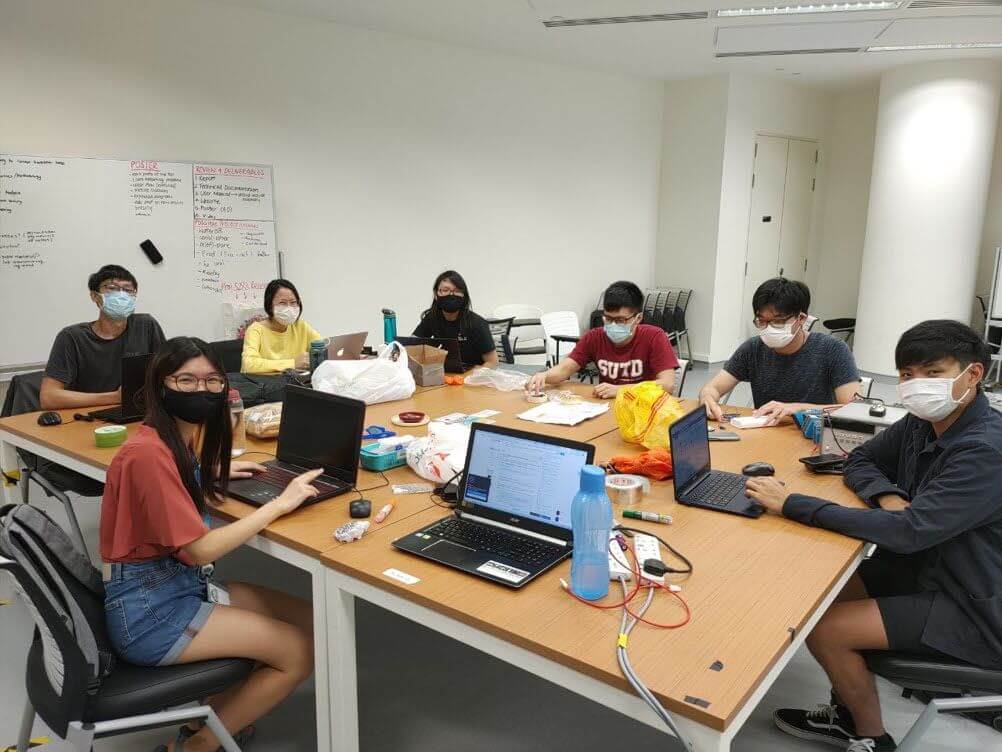
Meet the team that came up with an automated and economical end-to-end solution to solve the problem of coral reef monitoring in Singapore. Source: Singapore University of Technology and Design (SUTD)
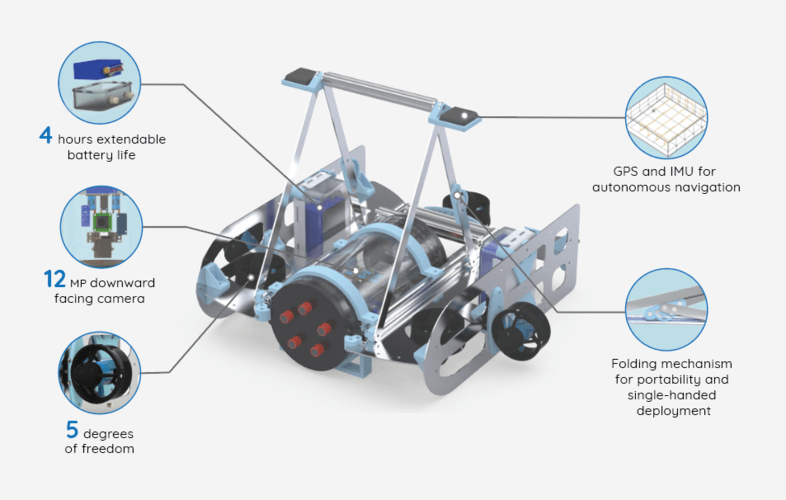
Corabot’s autonomous underwater vehicle (AUV) that collects image data and transfers it to the cloud on behalf of marine biologists. Source: Singapore University of Technology and Design (SUTD)

After the AUV surfaces, the image data is transferred to the cloud where artificial intelligence is employed to automate a three-stage data process in a matter of seconds, starting with colour correction, followed by coral species prediction and coral segmentation. Source: Singapore University of Technology and Design (SUTD)
Another SUTD team is tackling the problem of monitoring coral reef in Singapore. The process is highly complex and tedious, made harder by the country’s non-ideal water conditions. Their solution? An autonomous underwater vehicle (AUV) that collects image data and transfers it to the cloud. Artificial intelligence then colour corrects, classifies, and segments coral species before displaying results on an intuitive graphical user interface (GUI).
Associate Professor Lynette Cheah from SUTD’s Engineering Systems and Design pillar is making sure our increasing travel needs are sustainable in the long run. She leads the Sustainable Urban Mobility research group at SUTD which looks at reducing the environmental impacts of passenger and urban freight transport through data-driven models and tools. “One of the most recent projects we did was a look at freight transport or the movement of goods in the city and we think of different ways to optimise the movement,” Cheah says. “One thing we found out through the research study was that trucks actually idle quite a fair bit and also are not fully loaded most of the time. These are signs of inefficiencies that we’re trying to correct.”
With all of the above, coupled with experiential learning opportunities through 2D Design and Capstone Design Projects, Fifth Row activities and the Undergraduate Research Opportunities Programme (UROP) etc. focusing on sustainability, SUTD students are ready to spark innovation and design an eco-friendly future. To join a cohort of visionary minds pioneering sustainability at Singapore University of Technology and Design, click here to learn more.
Join SUTD to be part of a new generation of Design Innovators! Click here for more info
Follow Singapore University of Technology and Design on Facebook, Twitter, Instagram and LinkedIn

